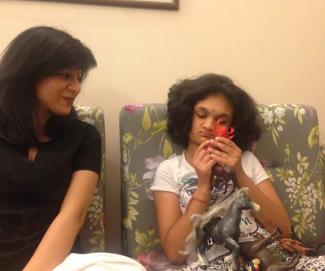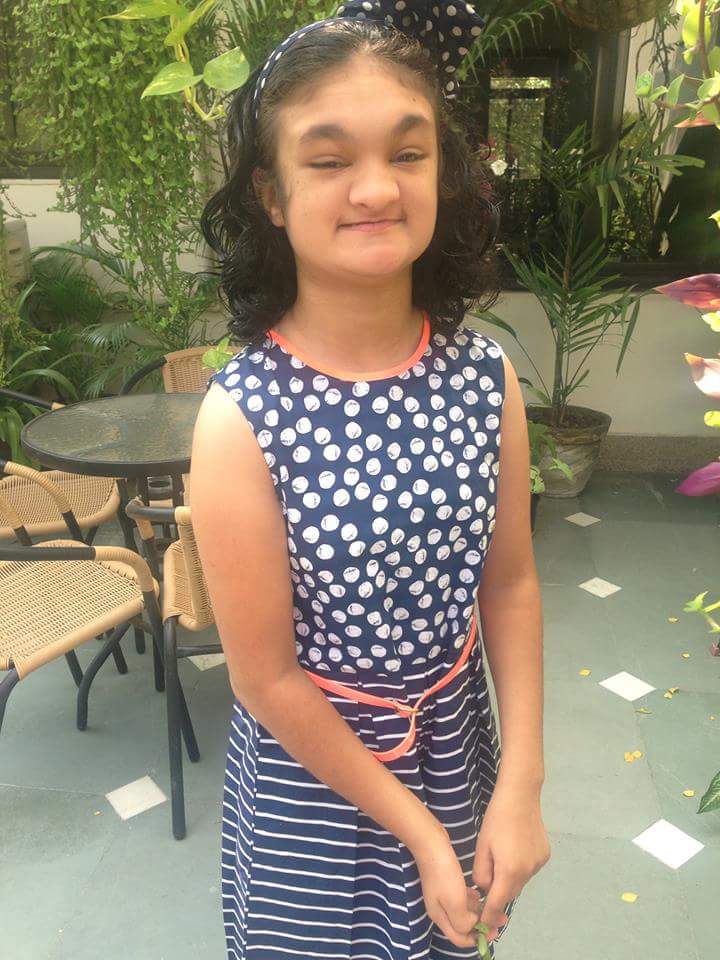
and other annoying questions that parents of children with disabilities do not want to hear. Ruchika Sethi Takkar, a mother who is raising a daughter with multiple challenges, helps you out by sharing the 13 most awkward questions that she has encountered. She also has a tip.
Living with Manavi as her partner, communicator, mood reader, therapist and, aha...yes, mama, I have learnt to be extra perceptive of the world around me. Till 14 years ago, a social interaction with a stranger meant nothing other than a nod, a smile, a Namaskar and we both moved on. Today, when I see a stranger approaching us my antennas go up. Will it be a casual nod or some horrible comment or enquiry? Will I be at his or her mercy and need to vehemently say we are okay, or no we don't want to go to xyz doctor, nor want to climb Mount Everest and pluck a yellow rose to cure the "special child"!!
In the year 2002, Manavi came into our lives and changed the way we would interact and see the world. Meeting her medical needs with tons of special needs, facing her challenges and learning the tiniest of things and skills was not only emotionally and physically draining but created a huge need to be loved and accepted by all around us. Don't we know the best medicine for the soul is TLC (Tender loving care).

Of course, the joys were manifold too since it was unsullied love, innocence and inner strength of a brave heart we were privileged to see and grow with. It was this spirit I always wanted to share with the world around me, and not be treated as second class citizens which is unfortunately the way most look at you.
Don't look at the disability of my child, see within her the spirit to experience and know life around her with complete acceptance of one and all.
Without doubt, each of us parents wants to introduce our children to the society as a child first. But, given the biases and prejudices we encounter, this not only poses huge visible, but also invisible social barriers making it anything but easy to allow us and our child to feel an equal part of the social fibre.
Moreover, when you step out of your house with your child, you keep away the disabling condition and look at the beautiful world as a facilitator to her development and growth. To restate the clichéd - Yes, it does take a village to raise a child...all children.
Little do you realise that the impediments are far deeper and greater in the external environment, than those faced by your own child's condition.
It does get challenging when some overtly concerned society members comment and judge on seeing the child without really knowing the person. They may not wish any ill. But here is what I would suggest as a parent who is raising a daughter with multiple challenges, yet only sees a child in her and hopes others see some strength of character in her. And, if nothing else, just smile back.
What not to say when you see our kids.
1. Oh… is she special needs?
No, she is a child with a lovely smile and twinkling eyes. Yup… she does have some special needs.
See the child first, not the disability.
2. What is her problem?
When I walk out of my home, I am not walking out with a ‘problem’, but a girl who just wants to have a good time. Well, I don't see a problem in you. Even if I do, I keep shut. It can only help me if you see in me strength, not weakness.
3. Is she like this from birth?
How does this question help? What will it establish? It's one of the most frequently asked questions.
4. What's her age?
I have begun to say...well, she has many ages. She has different ages within her - physical, intellectual, emotional - which one you wish to know. But are we not a sum total of many ages within our own selves? Yup, she is more transparent and less manipulative than many of us incorrigible lot who hide our real selves.
When you do say this, you are reducing her to a biometric stat.
5. Why is she so angry or upset?
Manavi is nonverbal. And, just as a verbal child will babble or talk dime to a dozen negotiating with his parent - I don't like this, I do not want to go here, I want to buy that, etc, etc - Manavi, and kids like her, use their facial expressions, internalizing a lot of their thoughts. They don't want to be rude, but a lot is going on in their mind. And yes, some of our kids have certain phenotype (certain observable characteristics) which should not define their nature.
If the child is uncomfortable or looking troubled, it is best not to restate the same. Trust me, it will only brew more trouble for the parent.
6. Why is she flapping her hands?
One of the reasons we need an inclusive society is to become comfortable with different expressions and behaviours which are not meant to be obstructive but are merely extensions of certain conditions and challenges the child is facing.
Flapping of hands, jumping, rocking are self-stimulating/stimming behaviours and, many a times, for want of a verbalization, the body is expressing its anxiety or joy through its body.
If something looks odd to you, it’s okay, it's odd. Odd or Even both belong to the same category of numerical ahem humanity in our case.
7. Do you give her anything to eat?!!
Do I need to answer this! If anything, believe me, many of us parents would have researched DIET as no medical nutritionist would. Special genetic conditions, allergies, etc. do make it difficult for the child to gain weight, but I am no Cinderella stepmom to deny her food. Her very existence and neuro development depends on good nutrition.
8. Will she ever be okay?
I love this one. Is anybody ever okay? The so called okay people, we do call as Neurotypical do profess hate and biases towards caste, gender colour…are we okay??
9. You don't have any other child - Why? Who will take care of her or your old age?
Seriously!!
10. Could my child observe her to know what empathy is?
Oh dear ...
Pity, sympathy, empathy...lovely virtues to have ...just don't overprotect overshield your child. And try seeing all with an equal eye. Your child will surely gain all such virtues.
11. Which special school does she belong to?
Regarding this particular comment, my heart wants to scream out ...she belongs to this special world, our world special schools, integrated schools…well, that's another topic that I will write later on.
But why must anyone see a child with a disability and have the urge to comment that she belongs elsewhere?!
12. Does she feel anything?
Many of our kids may not be able to tell their name or talk due to speech disorders or delays, but they are receiving all the information and extremely sensitive to some comments. There are many expressions which are nonverbal, just engage with the child and slowly but surely he or she will communicate with you and feeling will pour out a galore!!
13. Oh please, please do not speak of past karmas, past life, sins and last life debt...or future nirvana!!
When you as a parent wade through each day looking for some semblance of equanimity, the last thing you want to hear is that there is some ‘reason’ behind all this. Be it genetics or design or accident. The birth of a child has evinced the need to serve the little person to find her place on this planet. All else ceases to matter.
TIP: So you may still ask - but what is it that I need to say when I see a kid with special needs.
Nothing other than - Hi kiddo! If you have genuine interest in us, just enjoy us being around you. Believe me, that's enough to feel we all belong to the same universe we have been born to. A big warm smile will embrace us both and we look forward to bumping into you during our next sojourn.






